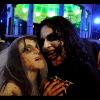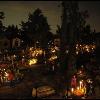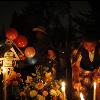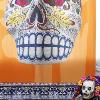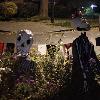

Topics: Religion Tags: Day Of The Dead View |
Topics: Religion Tags: Day Of The Dead View |
Topics: Religion Tags: Day Of The Dead View |
|||||||||
Topics: Religion Tags: Day Of The Dead View |
Topics: Religion Tags: Day Of The Dead View |
Topics: Religion Tags: Day Of The Dead View |
|||||||||
Tags: Day Of The Dead View |
Tags: Day Of The Dead View |
Day of the Dead (lang-es D�a de los Muertos), is a holiday (religious holiday) celebrated in Latin America and by Latin Americans living in the United States and Canada. The holiday focuses on gatherings of family and friends to pray for and remember friends and family members who have died. The celebration occurs on November 2 in connection with the Catholic (Roman Catholic Church) holidays of All Saints Day (November 1) and All Souls Day (November 2). Traditions connected with the holiday include building private altars honoring the deceased using sugar skulls, marigolds, and the favorite foods and beverages of the departed, and visiting graves with these as gifts. Due to occurring shortly after Halloween, the Day of the Dead is sometimes thought to be a similar holiday, although the two actually have little in common. The Day of the Dead is a time of celebration, where partying is common.
Scholars trace the origins of the modern holiday to indigenous observances dating back thousands of years, and to an Aztec festival dedicated to a goddess called Mictecacihuatl. In Brazil Dia de Finados is a public holiday, which many Brazilians celebrate by visiting cemeteries and churches. In Spain, there are festivals and parades, and at the end of the day, people gather at cemeteries and pray for their dead loved ones. Similar observances occur elsewhere in Europe and in the Philippines, and similarly-themed celebrations (Ancestor worship) appear in many Asian (Culture of Asia) and African (Culture of Africa) cultures.

